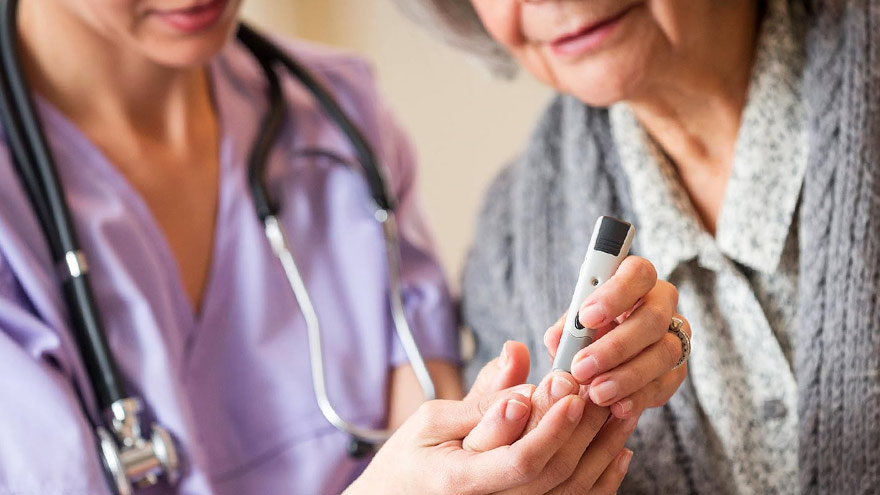Buscar
-
5 maneras de prevenir la diabetes
November is National Diabetes Month, and with cases of the disease at an all-time high in the U.S., individuals must do everything they can to stay healthy. Learn more about diabetes prevention and also how to stop prediabetes in its tracks with these five helpful tips. Diabetes is a disease that is increasingly making its way into the public consciousness, and not in a good way. In fact, according to USA Today, diabetes has a greater health impact on Americans than heart disease, substance use disorder or COPD, with 30.3 million Americans diagnosed with the illness — and many more who are at risk for developing it. And those with prediabetes are at risk for developing type 2 diabetes in 10 years or less, according to the Mayo Clinic. The American Medical Association notes that 4 million U.S. adults have prediabetes. Check out the American Diabetes Association’s prediabetes risk test. The good news: There are ways to manage — and even reverse — prediabetes. Renown’s Certified Diabetes Educator Stephen Compston, RD, LD, CDE, shares five steps for managing blood sugar and also avoiding an eventual diagnosis. How to Prevent Diabetes Eat healthy foods. Plan meals that limit (not eliminate) foods that contain carbohydrates, which raise your blood sugar. Carbohydrates include starches, fruits, milk, yogurt, starchy vegetables (corn, peas, potatoes) and sweets. “Substitute more non-starchy vegetables into your meals to stay satisfied for fewer carbohydrates and calories,” Compston says. Exercise. Blood sugar is the body’s basic energy source. When you exercise, you are lowering your blood sugar. “People with prediabetes usually want to stay off of medication, so they must add something to their normal regimen that lowers blood sugar,” Compston says. “In this case, exercise is medicine.” Lose weight. A small decrease in your weight can drastically decrease your risk of developing diabetes in the future. The Diabetes Prevention Program study showed that a 7 percent decrease in body weight (14 pounds for a 200 pound person) can reduce a person’s risk of developing the disease by 58 percent. Get more rest. Studies link sleep issues to an increased risk of insulin resistance. It can also make it harder to lose weight. Thus, people that don’t get adequate sleep are at an increased risk for developing type 2 diabetes. See your doctor regularly. Schedule an appointment with your primary care provider at least once a year so you can track your health together. “A regular check-up and lab work can help identify what your blood sugars are doing so you and your doctor can develop a good plan for delaying the onset of diabetes,” Compston says.
-
The Facts About Menopause and Early Menopause
Menopause is something that every woman experiences at some point in her lifetime. Learn what to expect and how you can help manage the symptoms and health risks. Most women don’t experience menopause until their 50s, but certain factors such as chromosomal abnormalities, glandular problems and chemotherapy can cause early menopause before the age of 40. No matter what your age, it’s a good idea be aware of the risks and treatments available to maintain a comfortable and healthy lifestyle. Health Risks of Menopause Two of the biggest health risks posed to women who have gone through menopause are bone density loss and risk of cardiovascular disease. Bone loss can be treated with bisphosphonate and estrogens. “Calcium with vitamin D and weight bearing exercise will also limit bone loss,” says Vickie Tippett, MD and OB/GYN at Renown Health. For cardiovascular risk, a healthy lifestyle is key. Discontinuing tobacco use, getting regular exercise and maintaining a healthy weight and diet all help reduce a woman’s risk of cardiovascular disease. Managing Discomforts of Menopause One of the most common complaints about menopause is the discomfort of hot flashes. “Hot flashes can be treated with systemic estrogen alone or in combination with progesterone or another agent similar to estrogen,” Dr. Tippett says. “Non-hormonal medications such as SSRIs and antidepressants also work.” Vaginal dryness, another common symptom of menopause, can also be treated with estrogen, estrogen-like compounds and personal lubricants. Pills, patches, creams and many other formulations are available to help alleviate discomfort. Knowing when, why and what to expect when it comes to menopause can help make the transition easier. Learn the facts about menopause in the infographic below.
Read More About The Facts About Menopause and Early Menopause
-
What Every Woman Needs to Know About Dense Breast Tissue
In honor of International Women’s Day, we’re working to spread the word about taking care of your breast health and encouraging the women in your life to do the same. Heather Reimer is on a mission — a mission to educate women everywhere about breast tissue type. For women with dense breasts, knowing your breast tissue type is absolutely critical, as cancers embedded in dense breast tissue are not always detectable with a mammogram alone. Dense breast tissue requires a breast ultrasound screening to get a complete breast health picture. Whole Breast Ultrasound for Dense Breast Tissue Heather knows this firsthand. She has dense breasts, and in this video she shares her story about finding breast cancer during a breast ultrasound screening — cancer that went undetected with her mammogram screening alone. As a result of that experience, Heather founded Each One. Tell One. — a movement to encourage women to pass along this information to others and to prompt those with dense breast and implants to consult with their doctor to schedule a whole breast ultrasound screening. To schedule a mammogram or a whole breast ultrasound, call 775-982-8100.
Read More About What Every Woman Needs to Know About Dense Breast Tissue


